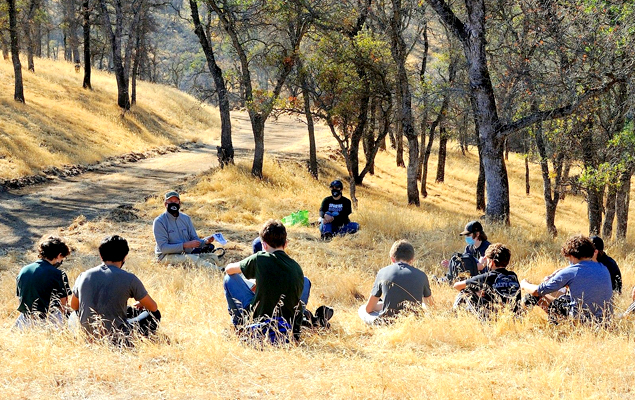
Program addresses 'nature deficit disorder'
Located in Contra Costa County, Mount Diablo is a popular destination for San Francisco Bay Area residents. Visible from most of the Bay Area, the mountain’s peak is in Mount Diablo State Park.
Save Mount Diablo (SMD) is a nationally accredited, nonprofit land trust with a mission to preserve Mount Diablo's peaks, surrounding foothills, and watersheds. Save Mount Diablo is inventing new ways to connect young people to nature during the pandemic and learn together about the natural world.
"Kids get it," said Ted Clement, Executive Director of Save Mount Diablo. "They know how to adapt. So, when we had to change the way we deliver our experiential Conservation Collaboration Agreement (CCA) education program, they and their teachers took up the challenge and are making it work."
Since 2018, Campolindo High School in Moraga has participated in Save Mount Diablo's multi-day program of classroom and outdoors learning experiences. This year's class of 150 AP Environmental Studies students is casting a new model for the demands of social distancing and closed classrooms.
They have a high standard to meet: Previous classes participating in the program seriously boosted their knowledge levels and intentions to spend more time outdoors. This is important because youth today, "spend less time outside than prison inmates, with the average child playing freely outside for just four to seven minutes a day," according to a 2017 report commissioned by REI Co-op, The Path Ahead.
This report notes that the average American now spends about 95 percent of their life indoors. The report further states that we are becoming an "indoor species," which comes with consequences: "Our health and well-being may suffer. And the less we value our outdoor spaces, the less likely we are to protect them."
Clement expressed appreciation for Campolindo High School's willingness to innovate. "It's not easy to be the first to try out a new format," he noted. "But it's clear that the special Campolindo teachers have confidence in their students and want to provide them with unique learning experiences, and the students have stepped up in kind. This type of leadership is directly addressing the disturbing trend of 'nature deficit disorder' in our modern culture."
Each CCA program has three basic parts, starting with an in-class presentation by SMD staff introducing students to Mount Diablo land conservation. This year, to keep students safe, SMD gave a Zoom presentation instead.
For the second part of the agreement, students spend a full day outdoors. They go on an interpretive hike led by a trained naturalist and SMD staff, complete a nature service project such as planting native grasses, hear a local ecology lesson, and conclude with a solo writing exercise reflecting on their part in nature. The Campolindo High School group was prepared to keep to this format, being careful to follow social distancing guidelines.
Students' projects ranged from gathering and planting acorns, to transforming trash into art, to cleaning out the gutters on a neighborhood street. The class described their solo experiences, and some shared their journal entries. One commented, "I went up on this hill behind my neighborhood. It was completely silent. It gave me a chance to think. . . . My role in nature is to enjoy it but more importantly to protect it." Another said, "I need to take a step forward into saving the land and saving nature. This is affecting my generation and generations after me." A third noted, "We're all a part of the natural world; everything around us comes from nature."
Tren Kauzer, one of the participating Campolindo High School teachers, stated, "With distance learning, students have been spending countless hours in front of screens. By partnering with Save Mount Diablo, Campolindo AP Environmental Science students had the opportunity to experience a break from screen time, a moment to quiet their minds and recharge in nature during these stressful times.”
